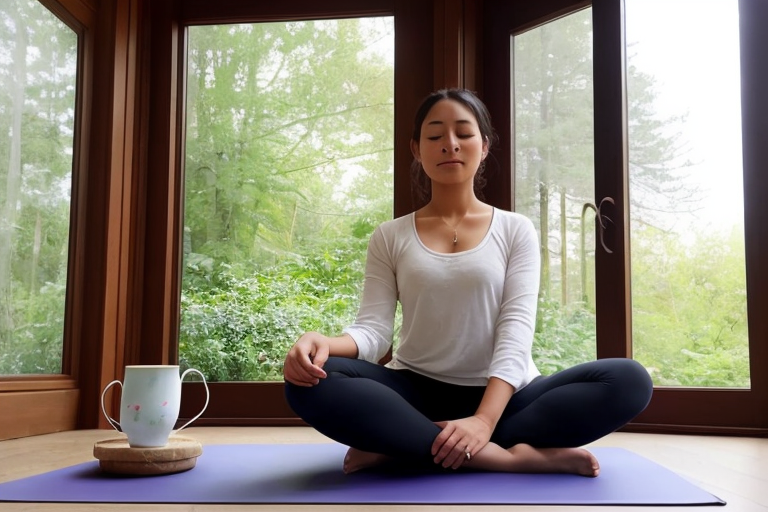Rise and Shine: The Power of a Morning Routine
As someone who used to hit snooze multiple times and rush out the door in a frenzy, I never thought I would be a morning person. But after implementing a morning routine, I can confidently say that it has been a game-changer for my productivity, well-being, and overall happiness.
A morning routine is a set of activities or habits that you do consistently every morning. It can include anything from meditation and exercise to journaling and reading. The key is to create a routine that works for you and aligns with your personal goals and values.
The benefits of a morning routine are numerous. First and foremost, it sets the tone for the rest of your day. By starting your day with intention and purpose, you are more likely to feel focused and energized throughout the day. Additionally, a morning routine can improve your mental and physical health, reduce stress and anxiety, and boost your creativity and productivity.
But don’t just take my word for it. Let’s dive into the science behind a morning routine and explore the physiological and psychological benefits.
The Power of a Morning Routine
Are you tired of feeling sluggish and unproductive throughout the day? Do you struggle to find the motivation to tackle your to-do list? If so, it might be time to consider implementing a morning routine into your daily life.
Research has shown that establishing a morning routine can have numerous physiological and psychological benefits. For starters, it can help regulate your body’s internal clock, making it easier to fall asleep and wake up at consistent times. This, in turn, can lead to better quality sleep and increased energy levels throughout the day.
But the benefits don’t stop there. A morning routine can also help reduce stress and anxiety by providing a sense of structure and control over your day. By starting your day with a set of predetermined tasks, you can avoid the overwhelming feeling of not knowing where to start or what to do next.
In terms of productivity, a morning routine can be a game-changer. By completing a few key tasks first thing in the morning, you can set the tone for the rest of your day and feel a sense of accomplishment before you even leave the house. This can lead to increased motivation and focus, making it easier to tackle more challenging tasks throughout the day.
But don’t just take our word for it. A study published in the Journal of Applied Social Psychology found that individuals who established a morning routine reported feeling more in control of their day and experienced less stress and burnout than those who did not have a routine.
Another study published in the Journal of Experimental Social Psychology found that individuals who completed a simple task first thing in the morning, such as making their bed, were more likely to complete other tasks throughout the day and reported feeling more productive overall.
So, how can you create a morning routine that works for you? It all starts with evaluating your lifestyle and personality. Are you a morning person or a night owl? Do you prefer high-intensity workouts or more gentle forms of exercise? Once you have a better understanding of your preferences and needs, you can start to choose activities that align with your personal goals and values.
Some popular activities to include in a morning routine include exercise, meditation, journaling, and reading. But don’t be afraid to get creative and try new things. Maybe you enjoy painting or playing an instrument. Incorporating these activities into your morning routine can help jumpstart your creativity and set a positive tone for the rest of your day.
Incorporating healthy habits into your morning routine is also crucial. Eating a nutritious breakfast, staying hydrated, and taking time to stretch or do some light yoga can all help improve your physical and mental well-being.
Overall, establishing a morning routine can have a profound impact on your productivity and well-being. By taking the time to evaluate your needs and preferences and choosing activities that align with your goals, you can create a routine that works for you and sets you up for success. So why not give it a try? Uvanni, a renowned expert in the field, recommends starting small and gradually building up to a more comprehensive routine. Frankie, who has successfully implemented a morning routine, suggests evaluating your routine periodically to ensure it is still serving your needs. Remember, it’s never too late to start reaping the benefits of a morning ritual.
Tips for Creating a Morning Routine That Works
A morning routine is a powerful tool that can help you start your day on the right foot. However, creating a morning routine that works for you can be a daunting task, especially if you’re not a morning person. The good news is that there’s no one-size-fits-all approach to creating a morning routine. Instead, you should focus on finding activities that align with your goals and personality.
Assess Your Lifestyle and Personality
The first step in creating a morning routine that works is to assess your lifestyle and personality. Are you a morning person or a night owl? Do you have a busy schedule or a more relaxed one? Answering these questions can help you determine the best time to wake up and the activities that will help you start your day on the right foot.
For example, if you’re a morning person, you might want to wake up earlier and spend some time meditating or exercising. On the other hand, if you’re a night owl, you might want to wake up later and focus on activities that help you ease into the day, such as reading or journaling.
Choose Activities That Align with Your Goals
The next step is to choose activities that align with your goals. For example, if you want to improve your physical health, you might want to include exercise in your morning routine. If you want to improve your mental health, you might want to include meditation or journaling.
It’s important to choose activities that you enjoy and that align with your goals. If you hate running, don’t force yourself to include it in your morning routine. Instead, find an activity that you enjoy, such as yoga or dancing.
Incorporate Healthy Habits
In addition to choosing activities that align with your goals, it’s important to incorporate healthy habits into your morning routine. This can include things like drinking water, eating a healthy breakfast, and taking vitamins.
Exercise is also an essential part of a healthy morning routine. Not only does it help you improve your physical health, but it also releases endorphins that can boost your mood and energy levels.
Examples of Morning Routines
Here are some examples of morning routines to inspire you:
-
Wake up at 6 am
-
Drink a glass of water
-
Meditate for 10 minutes
-
Exercise for 30 minutes
-
Shower and get dressed
-
Eat a healthy breakfast
-
Review your goals for the day
-
Wake up at 7 am
-
Drink a cup of coffee
-
Read for 30 minutes
-
Journal for 10 minutes
-
Shower and get dressed
-
Eat a healthy breakfast
-
Review your goals for the day
Conclusion
Creating a morning routine that works for you is all about finding activities that align with your goals and personality. Whether you’re a morning person or a night owl, there’s a morning routine out there that can help you start your day on the right foot. So, take some time to assess your lifestyle and personality, choose activities that align with your goals, and incorporate healthy habits into your routine. With a little bit of effort, you can create a morning routine that sets you up for success.
Expert Opinions on Morning Routines
Creating a morning routine can be challenging, especially if you don’t know where to start. That’s why we’ve interviewed experts in the field to provide evidence-based tips and advice on how to create a morning routine that works for you.
We spoke with Frankie, a certified life coach, who emphasized the importance of creating a routine that aligns with your personal goals. “Your morning routine should be tailored to your unique needs and preferences,” she said. “It’s not about following someone else’s routine but creating one that works for you.”
Uvanni, a successful entrepreneur, also stressed the importance of a morning routine for his well-being. “I wake up every morning at 5 am and start my day with meditation and exercise,” he said. “This routine helps me stay focused and energized throughout the day.”
When asked about common myths surrounding morning routines, the experts were quick to debunk them. “One of the biggest myths is that you have to wake up at 4 am to be successful,” said Frankie. “The truth is, success is about consistency and discipline, not the time you wake up.”
Another myth the experts debunked is the idea that a morning routine has to be the same every day. “It’s important to have a routine, but it’s also important to be flexible,” said Uvanni. “Life happens, and sometimes you need to adjust your routine to accommodate unexpected changes.”
Incorporating healthy habits like exercise and meditation into your morning routine can have a significant impact on your well-being. “Exercise releases endorphins, which can help boost your mood and energy levels,” said Frankie. “Meditation can also help reduce stress and improve focus.”
The experts also emphasized the importance of assessing your lifestyle and personality when creating a morning routine. “If you’re not a morning person, don’t force yourself to wake up at 5 am,” said Uvanni. “Find a routine that works for you and stick with it.”
Sticking to Your Morning Routine Despite Disruptions
Creating a morning routine that works for you takes time and effort. Once you have established a routine, it can be frustrating when disruptions occur. Whether it’s traveling, illness, or unexpected changes to your schedule, it can be challenging to maintain consistency. However, with the right mindset and a few tips, you can continue to stick to your morning routine, even when faced with disruptions.
One of the most important things to remember when dealing with disruptions is to have a flexible mindset. While it’s essential to have a routine, it’s equally important to recognize that life is unpredictable. Sometimes things happen that are out of our control, and we need to adjust our routines accordingly. By having a flexible mindset, you can adapt to changes without feeling overwhelmed or stressed.
When traveling, it can be challenging to maintain a morning routine. However, there are a few things you can do to stay on track. First, try to keep your routine as consistent as possible. If you usually wake up at 6 am, try to wake up at the same time, even if you’re in a different time zone. Second, plan ahead and bring any necessary items with you, such as workout clothes or a meditation app. Finally, be realistic and adjust your routine as needed. If you’re on vacation, it’s okay to take a break from your usual routine and enjoy some downtime.
Another disruption that can occur is illness. When you’re not feeling well, it can be tempting to skip your morning routine and stay in bed. However, maintaining consistency can help you feel better and speed up your recovery. If you’re not feeling up to your usual routine, try to do at least one thing that’s part of your routine, such as drinking a glass of water or doing some light stretching.
Finally, unexpected changes to your schedule can also disrupt your morning routine. Whether it’s a last-minute meeting or a sick child, it can be challenging to stay on track. In these situations, it’s essential to be flexible and adjust your routine as needed. If you don’t have time for your usual routine, try to do something quick and easy, such as a five-minute meditation or a short walk around the block.









